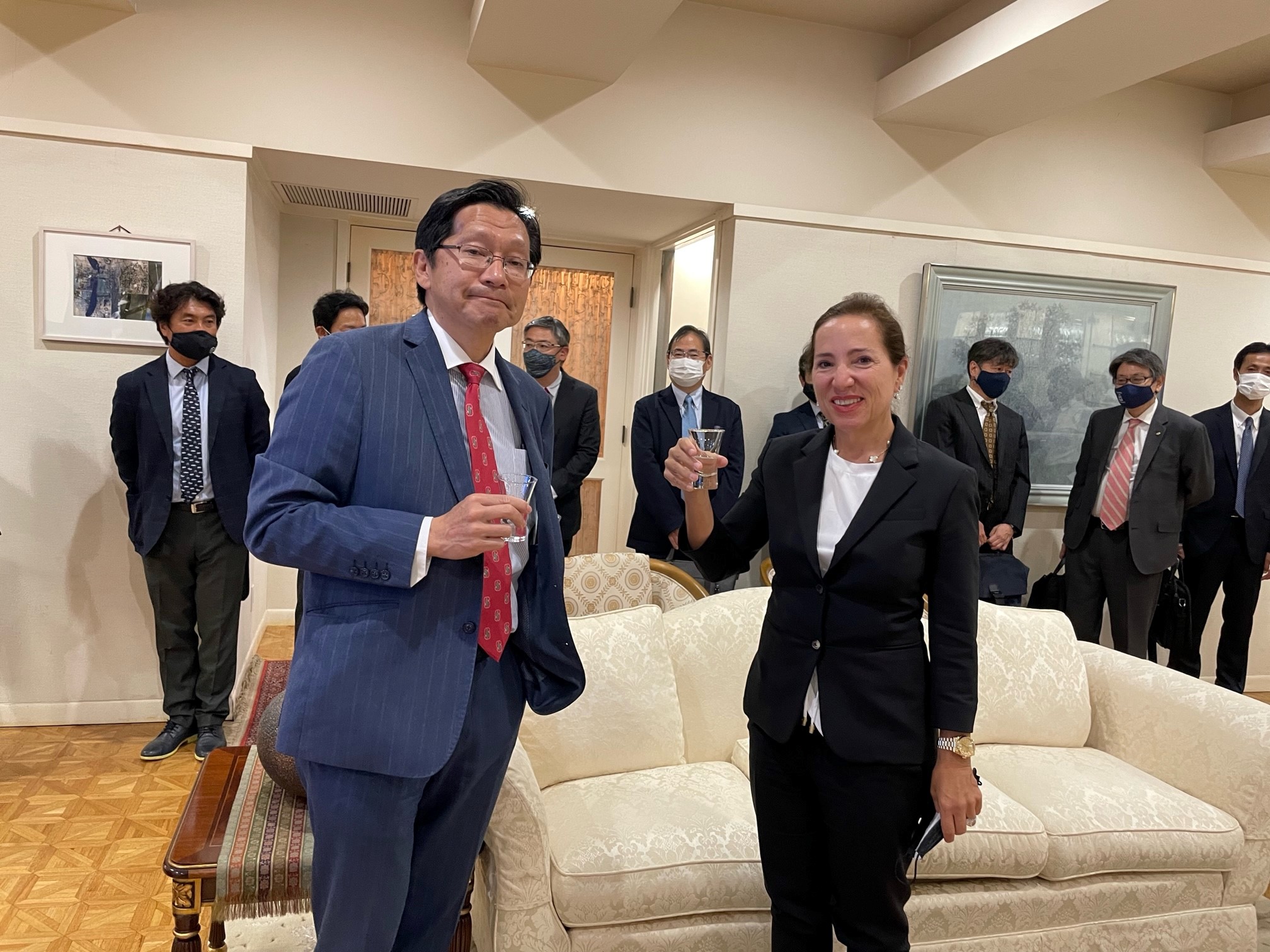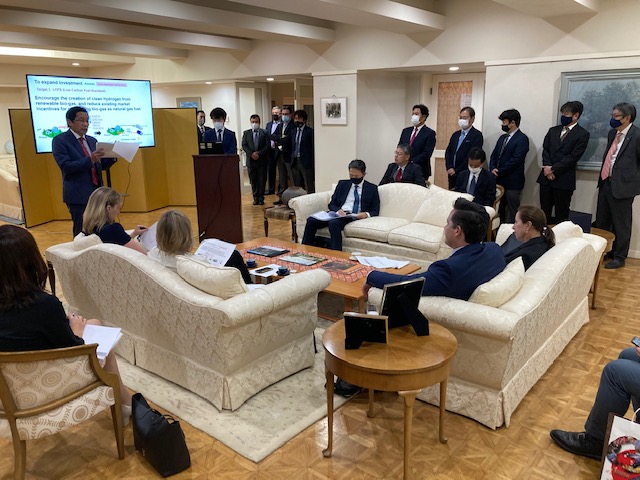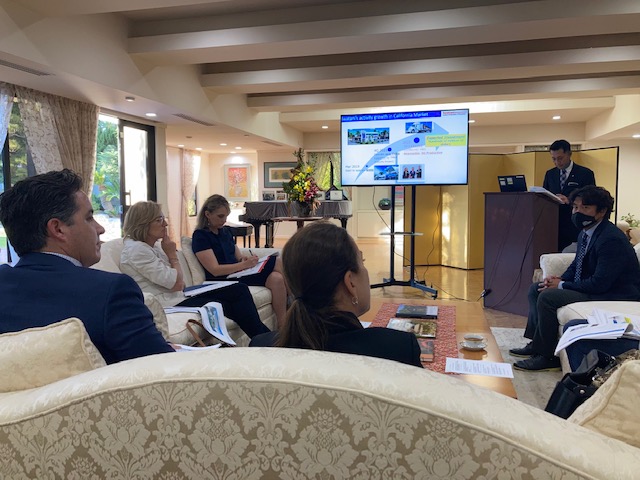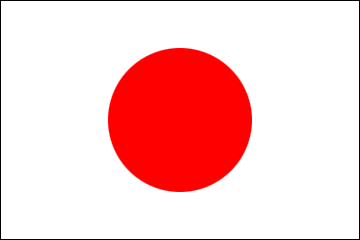Japanese Companies Invited to Present to California Lt. Governor and Director of Go-Biz
2021/11/15
On October 28th, Consul General Muto invited Japanese companies to join Lt. Governor Eleni Kounalakis and Go-Biz Director Dee Dee Myers at his official residence to present on decarbonization technologies and their activities in hydrogen.
In California, in September of 2018, electric power companies were mandated to cover 60% of electricity used in the state by 2030 and 100% by 2045 with carbon-free energy such as renewable energy. In addition, an executive order signed in September of 2020, established a goal that all new vehicles sold in California would be zero emission vehicles, including battery electric and hydrogen fuel cell vehicles.
In addition, California aims to have 250 hydrogen stations by year 2025, and the Los Angeles City Port Authority will revise the "Clean Air Action Plan" in 2017 in collaboration with the Long Beach Port Authority. It has been decided that port machinery will also be reduced to zero emissions by 2030 and trucks will also be zero emissions by 2035. In December 2019, the Los Angeles Department of Water and Power (LADWP) moved on plans to convert a coal fired power generation station in Utah to a blend of natural gas and hydrogen, then to 100% decarbonized hydrogen by 2045. Hydrogen is positioned to become an important energy source for the region.
At the 2nd Japan-US-Australia-India Summit held in September 2021, an agreement was reached on the formation of a network for greening and decarbonizing the shipping value chain, including the LA port, and at the same time, the establishment of a clean hydrogen partnership has been announced.
Based on these circumstances, our office invited the Government of California to confirm the cooperative relationship for the construction of a hydrogen value chain for decarbonization of LA port in the future.
The discussion focused on “decarbonization” of the Ports, Transportation, Energy Supply, and Investment in Decarbonization; Digital Infrastructure; as well as many specific suggestions for initiatives for new cooperation with California State government.
In summarizing the evening’s exchange of opinions, and to enhance the contribution of Japanese firms in realizing a hydrogen-based society, Consul General Muto recapped the discussion with a request for strong cooperation and collaboration, including financial incentives, from the State of California. Points he highlighted include:
・ Review of mechanisms in the Low Carbon Fuel Standard (LCFS) to accelerate low and zero carbon hydrogen production and use, with a focus on commercial purposes
・ Expand investment in hydrogen infrastructure through clean transportation programs and implement coordinated support for distribution hubs centered on ports
・ Consideration of regulatory procedures, including the creation of a “special hydrogen zone” concept at ports and surrounding areas to promote private investment
・ Foster market formation by actively supporting fuel cell integration into homes and offices through the Self Generation Incentive Program (SGIP), etc.
Lt. Governor Kounalakis indicated that the gathered companies had promising projects, she thanked them for their contributions to the State and indicated that her office looks forward to opportunities for further collaboration and support in the areas requested during the course of the evening’s presentations.
Speakers on the day:
Toyota Tsusho America Vice President Koji Nakagawa
Toyota North America Senior Executive Engineer Takehito Yokoo
Mitsui & Co., Ltd. America Director Daisuke Yanagisawa
Iwatani Corp. Senior Director Kazushige Uemura
Mitsubishi Heavy Industries America New Business Development Vice President Ryosuke Sakai
Choshu Industry America Chief Executive Officer Sean Chigusa
Adept Development Director Robert Montano
i-Probe Chief Strategy Officer Shinya Shimada
JBIC, Regional Head for the Americas, Resident Executive Officer, Nagayoshi Motokawa
MUFG Bank Head of Los Angeles Branch Tomoki Nakatani
NEDO Silicon Valley Director General Kazuaki Osumi
In California, in September of 2018, electric power companies were mandated to cover 60% of electricity used in the state by 2030 and 100% by 2045 with carbon-free energy such as renewable energy. In addition, an executive order signed in September of 2020, established a goal that all new vehicles sold in California would be zero emission vehicles, including battery electric and hydrogen fuel cell vehicles.
In addition, California aims to have 250 hydrogen stations by year 2025, and the Los Angeles City Port Authority will revise the "Clean Air Action Plan" in 2017 in collaboration with the Long Beach Port Authority. It has been decided that port machinery will also be reduced to zero emissions by 2030 and trucks will also be zero emissions by 2035. In December 2019, the Los Angeles Department of Water and Power (LADWP) moved on plans to convert a coal fired power generation station in Utah to a blend of natural gas and hydrogen, then to 100% decarbonized hydrogen by 2045. Hydrogen is positioned to become an important energy source for the region.
At the 2nd Japan-US-Australia-India Summit held in September 2021, an agreement was reached on the formation of a network for greening and decarbonizing the shipping value chain, including the LA port, and at the same time, the establishment of a clean hydrogen partnership has been announced.
Based on these circumstances, our office invited the Government of California to confirm the cooperative relationship for the construction of a hydrogen value chain for decarbonization of LA port in the future.
The discussion focused on “decarbonization” of the Ports, Transportation, Energy Supply, and Investment in Decarbonization; Digital Infrastructure; as well as many specific suggestions for initiatives for new cooperation with California State government.
In summarizing the evening’s exchange of opinions, and to enhance the contribution of Japanese firms in realizing a hydrogen-based society, Consul General Muto recapped the discussion with a request for strong cooperation and collaboration, including financial incentives, from the State of California. Points he highlighted include:
・ Review of mechanisms in the Low Carbon Fuel Standard (LCFS) to accelerate low and zero carbon hydrogen production and use, with a focus on commercial purposes
・ Expand investment in hydrogen infrastructure through clean transportation programs and implement coordinated support for distribution hubs centered on ports
・ Consideration of regulatory procedures, including the creation of a “special hydrogen zone” concept at ports and surrounding areas to promote private investment
・ Foster market formation by actively supporting fuel cell integration into homes and offices through the Self Generation Incentive Program (SGIP), etc.
Lt. Governor Kounalakis indicated that the gathered companies had promising projects, she thanked them for their contributions to the State and indicated that her office looks forward to opportunities for further collaboration and support in the areas requested during the course of the evening’s presentations.
Speakers on the day:
Toyota Tsusho America Vice President Koji Nakagawa
Toyota North America Senior Executive Engineer Takehito Yokoo
Mitsui & Co., Ltd. America Director Daisuke Yanagisawa
Iwatani Corp. Senior Director Kazushige Uemura
Mitsubishi Heavy Industries America New Business Development Vice President Ryosuke Sakai
Choshu Industry America Chief Executive Officer Sean Chigusa
Adept Development Director Robert Montano
i-Probe Chief Strategy Officer Shinya Shimada
JBIC, Regional Head for the Americas, Resident Executive Officer, Nagayoshi Motokawa
MUFG Bank Head of Los Angeles Branch Tomoki Nakatani
NEDO Silicon Valley Director General Kazuaki Osumi
 |
| Consul General Muto, Lt. Governor Kounalakis Celebratory Photo following Discussions |
 |
 |
| Proposal explanation by Consul General Muto | Q & A by Lt. Governor Kounalakis |
